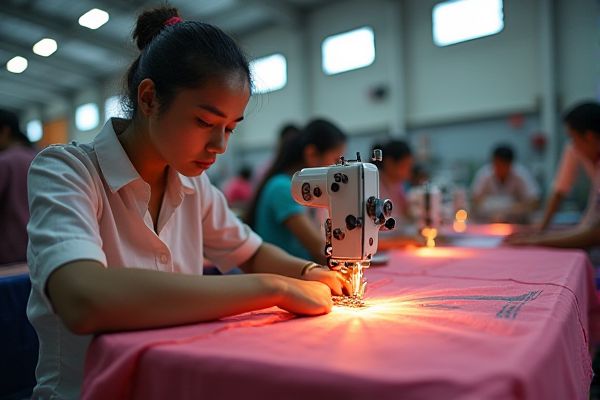
India's textile industry offers a diverse range of job opportunities across various sectors, including manufacturing, design, and marketing. The sector is known for both its traditional handloom and modern textile technologies, providing roles in weaving, dyeing, and finishing processes. Employment opportunities exist in areas such as quality control, textile engineering, and fashion design, catering to both domestic and international markets. Moreover, with the growth of sustainable and eco-friendly textiles, there is an increasing demand for professionals skilled in innovative textile production techniques.
Job Description
Textile jobs in India encompass a wide range of roles, including design, production, quality control, and marketing. Professionals in this industry often engage with traditional techniques while incorporating modern technologies, contributing to the growth of a vibrant textile sector. Opportunities exist in mills, garment manufacturing units, and export companies, catering to both domestic and international markets. Your skills in textiles can significantly impact the economy, as this sector is a major contributor to India's GDP and employment.
Requirement
Textile jobs in India require a range of skills and qualifications, catering to various roles in manufacturing, design, and management. Candidates often need a background in textile engineering, fashion design, or a related field, along with practical experience in textile production processes. Knowledge of industry standards, quality control, and sustainable practices is increasingly important, reflecting the global shift towards eco-friendly textiles. You may also benefit from strong analytical skills and familiarity with textile machinery to enhance your employability in this growing sector.
Salary and Perks Expected
Textile jobs in India offer a diverse range of salaries and perks, varying significantly based on experience, location, and specific roles within the industry. Entry-level positions can start at around INR 15,000 to INR 25,000 per month, while experienced professionals may earn between INR 30,000 and INR 70,000 monthly. Many companies provide additional benefits such as health insurance, performance bonuses, and opportunities for professional development, enhancing your overall compensation package. The textile sector, being one of India's largest employers, presents numerous opportunities for career advancement and skill enhancement in a rapidly evolving market.
Similar Job Names
- Textile Engineer
- Textile Designer
- Fashion Designer
- Production Manager
- Quality Control Inspector
- Dyeing Technologist
- Weaving Technologist
- Knitting Technologist
- Textile Merchandiser
- Apparel Production Manager
- Fabric Technologist
- Garment Sample Coordinator
- Textile Quality Analyst
- Fashion Illustrator
- Textile Marketing Executive
- Supply Chain Manager
- Textile Technician
- Sales Executive (Textiles)
- Research and Development Manager
- Compliance Manager (Textiles)
Job Expectation Concept
The job expectations in textile jobs in India encompass a diverse range of roles, including design, production, and quality control. Professionals in this sector are often expected to possess a blend of technical skills and creativity, catering to both local and international markets. As the industry evolves, there is a growing demand for sustainable practices, making knowledge of eco-friendly materials and processes increasingly valuable. Understanding market trends and consumer preferences can significantly enhance your career prospects in this vibrant and competitive field.
Career Advantage and Weakness
Textile jobs in India offer significant career advantages such as a diverse range of opportunities, from manufacturing to design, catering to a large domestic and international market. The industry benefits from a rich heritage, which allows for creativity and innovation, making it appealing for those interested in fashion and craftsmanship. However, challenges include labor-intensive work conditions and wage disparities that can impact job satisfaction and growth. You might consider the varied skill development programs available that focus on sustainability and technology, enhancing employability in this evolving sector.
Important Thing Must Know
Textile jobs in India represent a significant portion of the country's employment landscape, providing diverse opportunities across various sectors such as manufacturing, design, and marketing. The industry is characterized by its vast supply chain, which includes spinning, weaving, dyeing, and finishing processes, creating an array of roles for skilled and unskilled workers alike. Understanding the importance of sustainability and eco-friendly practices is vital as the textile sector increasingly incorporates these elements to meet global standards. With advancements in technology, such as automation and digital design tools, there are emerging opportunities that require adaptability and continuous skill enhancement. Staying informed about industry trends and regulations will empower you to make informed career choices in this dynamic field.
Alternative Career Options
The textile industry in India offers a variety of alternative career options beyond traditional roles such as weaving or dyeing. Opportunities in textile design, quality control, and supply chain management allow individuals to leverage creativity and analytical skills. Engaging in roles related to sustainable practices, such as eco-friendly textile production or recycling initiatives, is increasingly important in today's market. Exploring educational programs in fashion technology or textile engineering can further enhance your expertise and open doors to specialized positions in this dynamic field.
Companies List
- Tata Group
- Birla Group
- Reliance Industries
- Aditya Birla Fashion & Retail
- Arvind Ltd.
- Welspun India
- Raymond Ltd.
- Vardhman Textiles
- Trident Group
- Alok Industries
List of Ideal City
Cities such as Surat, known for its vibrant textile industry, offer numerous opportunities in manufacturing and design. Tirupur, often referred to as the "Knitwear Capital of India," specializes in producing high-quality knitted garments, attracting global buyers. Ahmedabad, with its rich history in textile production, hosts many textile mills and educational institutions focused on textile engineering. Coimbatore, recognized for its spinning and weaving, provides a conducive environment for various textile-related jobs, making it an excellent choice for your career in this field.
 jobs-india.net
jobs-india.net